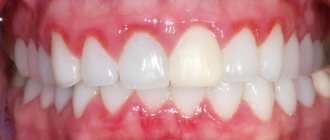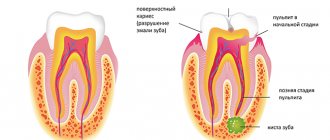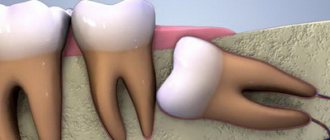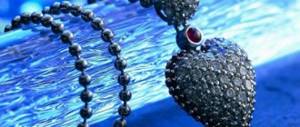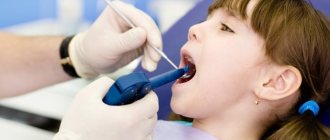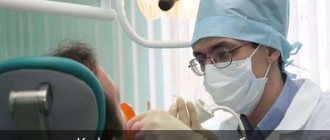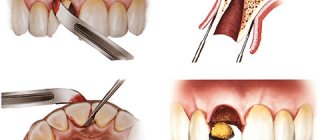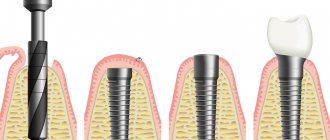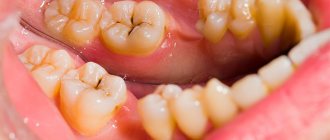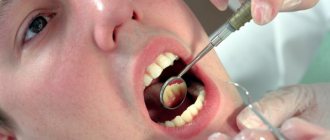31.10.2019
Most often, pain relief and tooth extraction during breastfeeding are a necessary measure. Pregnant women and nursing mothers are not recommended to undergo this operation. If the need for removal does arise, it is important to take precautions.
Content:
- Is it permissible to use local anesthetics?
- Anesthetics that can be used by nursing mothers
- Is it possible to feed a baby immediately after dental treatment is completed?
- How to reduce the likelihood of developing dental disease after childbirth
Many women experience the need for dental treatment while breastfeeding. This is due to the increased load on the body of a young mother, calcium deficiency, and hormonal changes. If you have a toothache, it is very important to seek qualified dental care as soon as possible. The doctor will tell you whether the disease can be treated without interrupting lactation.
Tooth extraction procedure for a nursing mother
- Tooth extraction in a nursing woman
- Tooth extraction during lactation includes the following steps:
- anesthesia;
- periotomy (detachment of the ligament);
- selection and application of forceps;
- tooth extraction;
- stop bleeding.
For pain relief, drugs are used that do not pass into breast milk or are excreted from it in the near future. Anesthesia is carried out using a carpule syringe and safe anesthetics.
Stopping bleeding from the hole is carried out by pressing with a cotton swab; usually within 5-10 minutes, thrombosis of the blood vessels occurs. In this case, a blood clot forms in the socket of the extracted tooth, from which the wound will heal.
Is it permissible to use local anesthetics?
There is a myth that any dental painkillers are strictly contraindicated for nursing mothers. It is because of this that women put off a visit to the dental clinic - only a few are ready to treat a sore tooth without anesthesia.
In fact, local anesthetics can be used during lactation. Not all medications are suitable, but the list of safe options is wide. Therefore, the patient will definitely not have to endure severe pain during the treatment of a deep carious cavity, pulpitis or advanced inflammation.
It is very important that the patient warns the dentist in advance that she is breastfeeding. Then the doctor will be able to choose the optimal pain reliever for her.
If the upcoming intervention is very serious and requires the mandatory administration of a potent analgesic, you should discuss with your doctor the possibility of carrying out all the manipulations later - when the lactation period is over. If the disease does not tolerate delay, arguing with a specialist is not only pointless, but also harmful to health - you just need to trust him.
Often, after dental therapy, the dentist prescribes a course of antibiotics. This also confuses mothers, since all antibacterial agents are excreted in milk, which means they can pose a danger to the newborn. In fact, there is no need to worry. If the doctor is warned about lactation, he will choose exactly the medicine that will not harm the baby. But the mother’s independent refusal of antibiotic therapy can lead to serious complications.
It is important to understand: in most cases, postponing therapy until later results in serious problems.
Therefore, the answer to the question of whether dental treatment is allowed during breastfeeding is affirmative. And the sooner a woman visits the dentist, the higher her chances of a speedy recovery.
Dental treatment while breastfeeding
If you are a nursing mother and are faced with dental problems, then visiting a dentist is absolutely necessary to prevent the harmful consequences of “neglected” dental health.
First you need to understand the possible causes of tooth pain during breastfeeding. There are a number of problems that can cause young mothers to feel discomfort in their teeth:
- Gingivitis
- Periodontitis
- Hypersensitivity.
- Caries and pulpitis.
This is inflammation of the gums, the causes of which can be a lack of vitamin C, smoking, decreased immunity, poor nutrition, and malocclusion. But the main reason is the proliferation of bacteria due to insufficient oral hygiene and accumulated plaque. The first symptoms of gingivitis are redness and itching of the gums, increased bleeding, inflammation and swelling.
This inflammation is one of the most severe forms of gum disease and can lead to permanent tooth loss. Such dental pathology can develop if gingivitis is not treated in time. The first symptoms are bleeding when brushing your teeth, red or swollen gums, and bad breath.
For the normal development of a child’s body, he needs a number of useful substances, including calcium. If a young mother does not receive enough microelements in her diet, then over time they will be susceptible to leaching from the body. This will lead to the destruction of enamel and increased fragility of bones, and as a result will lead to problems with teeth. The first symptoms are increased tooth sensitivity, sharp short-term pain in the teeth.
Caries are small spots on the surface of the tooth that appear due to the influence of harmful external and internal factors on the teeth and leading to inflammatory processes in the hard layers of the tooth. Pulpitis is an inflammation that flows from deep caries, which reaches the root canals and nerve endings, affecting them. Diseases of caries and pulpitis can be caused by simple non-compliance with oral hygiene, poor nutrition, as well as gastrointestinal diseases. Symptoms of these dental pathologies are acute pain from sweet or cold foods, severe aching pain that lasts 10 minutes or more.
Dental treatment under a microscope
Get an individual consultation with a specialist at the TopSmile clinic and find out whether it is possible to treat teeth during lactation
Get acquainted with the service
What to do if toothache occurs during lactation?
If you have a toothache, you should immediately contact a specialist who will conduct diagnostics to identify pathologies and give you accurate recommendations on the problem. However, due to the busy life of a nursing mother, there is not always time for an emergency trip to the doctor. This means that you don’t have to endure toothache before visiting the dentist’s office. You can reduce pain using the following procedures:
- Remove food debris that has fallen into the gaps between the teeth, which irritate the nerve upon contact;
- Apply a cotton swab moistened with Dent drops to the area with painful symptoms - this will reduce the pain and soothe the tooth;
- Rinse your mouth with solutions of furatsilin, hydrogen peroxide, chlorhexidine or potassium permanganate;
- Rinse your mouth after meals with a baking soda solution;
- Rinse your mouth with a decoction of oak bark;
- After consulting with your doctor, you can take a drug based on ibuprofen or paracetamol.
But you should not rely on the fact that such procedures will bring a long-term effect of peace and lack of discomfort. Only a dentist can prescribe real treatment that will help eradicate the source of pain and finally solve the problem. At the same time, do not forget to inform the nursing mother about your situation so that the specialist can choose the most appropriate medications for treatment and prescribe the necessary procedures that will not harm you and your baby.
What dental procedures should you avoid during lactation and why?
During the period of breastfeeding, do not forget that there are also dental procedures that you should avoid:
- Teeth whitening - it is contraindicated during lactation, since rehabilitation at this time occurs more slowly and can cause complications associated with a lack of calcium, which will lead to the appearance of enamel defects and the development of caries;
- The installation of dental implants is allowed only if the person is healthy and the body is able to endure a complex implantation operation and the adaptation period of the implant without much harm to it. During breastfeeding, women experience a lack of nutrients in the body, accompanied by weakness due to constant lack of sleep and anxiety. In addition, after implantation of dentures, the doctor must prescribe a course of antibiotics, which is undesirable for women during breastfeeding;
- Antibiotic therapy is an effective way to combat bacteria that affect the oral mucosa, which causes inflammation of the gums and pain in the teeth;
- The use of certain pain medications (analgin, citramon). The use of these drugs is prohibited, as they contain aspirin and caffeine, which are very dangerous for the child because they increase blood circulation. Analgin reduces the number of platelets and leukocytes, which leads to the destruction of bone marrow.
Is anesthesia acceptable during breastfeeding?
Today, almost every procedure related to dental treatment is performed using anesthesia. The doctor, taking into account the patient’s characteristics, selects the most suitable drug that does not cause negative reactions in his body. Anesthesia helps to get rid of pain during treatment and undergo surgery to eliminate dental pathology without experiencing discomfort and fear.
Problems that require local anesthesia:
- Root canal treatment;
- Tooth extraction;
- Removal of dental cysts;
- Fixing the pins.
It is possible to perform an anesthesia procedure for dental treatment during breastfeeding. In this case, it is necessary to choose the right anesthetics. For nursing women, short-acting local anesthetics are used, which are eliminated from the body 5-6 hours after administration and reduce sensitivity only in those places where it is necessary. These include:
- Novocaine - used in treatment with extreme caution if the intended benefit to the nursing mother outweighs the risks of harming the newborn baby;
- Lidocaine is one of the most commonly used anesthetic agents due to its low concentrations, which remain in the blood and milk of the nursing mother, and its short-lived effect;
- Articaine is also one of the relatively safe medications, characterized by minimal concentrations, due to which there is no need to interrupt breastfeeding after visiting the dentist.
If you have doubts about these drugs, you can consult a specialist who will select for you an individual anesthesia that will not harm either you or your child. But you should not abstain from the anesthesia procedure in any case, since during dental operations the body has a stress reaction, subsequently releasing adrenaline, which can cause excitement of the nervous system and tension on an emotional level in an infant.
Is it possible to feed a child after anesthesia?
Of course, you can feed a baby, but you need to remember precautions and know that anesthesia is finally removed from the body only after 5-6 hours. Therefore, you should follow the advice of doctors who recommend feeding the baby before the procedure and stocking up on breast milk. After anesthesia, you should drain the milk, which may have contained some of the anesthesia drug, by feeding the baby with milk that was expressed earlier.
Prevention of caries during lactation.
During lactation, women experience enormous stress on the body, but no one is immune from the occurrence of any diseases or pain. Therefore, it is worth following some recommendations to prevent situations that can negatively affect your health, psychological state and mood:
- Follow the rules for oral care and hygiene;
- Reduce consumption of sweet foods;
- Brush your teeth regularly with a quality brush and toothpaste without harmful chemicals;
- Do not consume too cold or hot foods and drinks;
- After each meal, rinse;
- Be sure to include in your diet foods rich in microelements and vitamins;
- Periodically visit the dentist's office to check the condition of the dentition and further consultation on maintaining dental health.
Anesthetics that can be used by nursing mothers
In dentistry, pain relief is usually classified into general and local. In the first case, we are talking about anesthesia - intravenous or inhalation. Local anesthesia is the numbing of an inflamed area using an injection, gel or spray. It is highly undesirable to use general anesthesia when providing dental care to nursing mothers. If this cannot be avoided, then until complete recovery the woman should feed the baby with a special infant formula or pre-prepared breast milk.
Among the local anesthetics used by dentists are:
- Novocaine. Allowed during lactation only in cases where the expected benefit for the woman is much higher than the possible risks for the baby. Before administering the solution to the patient, the dentist must weigh the pros and cons. Sometimes the medication causes negative side effects: headaches, weakness, drowsiness, convulsions, dizziness, arrhythmia, bradycardia, swelling of the lips.
- Lidocaine. The official instructions state that only a doctor can prescribe medicine to breastfeeding women. The drug passes into milk in very small quantities, and its oral bioavailability is low. This means that the amount of active substance that is released in milk is minimal. Therefore, the potential harm to the child is low. Possible adverse reactions after the administration of lidocaine: numbness of the tongue, convulsions, drowsiness, tinnitus, blurred vision, angioedema, urticaria and some others.
- Articaine. A product approved for both pregnant and lactating women. Dentists use it if they need to perform infiltration or conduction anesthesia. Side effects of the drug include: nausea, vomiting, dizziness, low blood pressure, allergies.
Attention! Nursing mothers are prohibited from administering anesthetics that contain high amounts of adrenaline.
Such drugs negatively affect the baby’s health, in particular, they provoke negative changes in the child’s cardiac activity.
Preparation for surgical treatment
- Stages of tooth extraction in a nursing mother
- The procedure for tooth extraction in a nursing woman includes:
- taking anamnesis;
- determination of indications for surgery;
- preparing the patient;
- tooth extraction;
- postoperative period.
In 90% of cases, an X-ray examination is performed before surgery. The procedure is safe for nursing mothers, since the woman is wearing a lead apron through which radiation does not pass. But it is still advisable to express milk after the examination. Then you can feed the baby without fear.
Preparation consists of eliminating the fear of manipulation and the dentist; for this purpose it is not prohibited to use sedatives. After the operation, you cannot feed the child for 2 to 6 hours: this is the period required to remove the painkiller from the body. To provide the baby with nutrition during this time, it is worth expressing milk and feeding the baby more strongly before surgery.
Is it possible to feed a baby immediately after dental treatment is completed?
Ideally, three to five hours should pass between the administration of the anesthetic and the application of the crumbs to the breast. Knowing this, a woman can prepare a portion of milk for one feeding.
During a forced break in lactation, it is recommended to pump. This simple measure will eliminate the occurrence of painful and unpleasant sensations.
What type of implantation is suitable for women during lactation?
To install implants during lactation, it is advisable to use minimally invasive methods. The best option is a one-step operation . In this case, immediately after tooth extraction, an implant is installed in the socket and, if necessary, bone tissue is built up. There are also express methods that allow you to install a titanium root through a cylindrical puncture in the gum. In this case, there is no need to cut the tissue and then stitch the wound. The level of complexity of the operation is comparable to a tooth extraction procedure.
Single-stage implantation: installation of a titanium structure at an angle.
The express operation takes place in several stages:
- Sanitation of the oral cavity.
- Channel formation.
- Installation of a titanium rod (the contours of the gingival cuff almost coincide with the shape of the upper part of the implant).
After complete healing of the tissues, the doctor assembles the rest of the structure, like a construction set. The abutment is screwed into the rod and the crown is attached to it. A gum former may not be needed because the edges of the wound are not extensive and do not require suturing.
Expert opinion:
“Women’s metabolism accelerates during pregnancy and lactation. At the same time, the immune system is still weakened, and regeneration processes are slow. The gum tissue is loose and takes a long time to heal after surgery. The implant healing time may take 5-6 months. There are frequent cases of titanium structure rejection. Therefore, surgery can only be done if absolutely necessary. It’s wiser to wait until the baby begins to wean itself off breast milk and the mother’s body gets stronger enough.”
Romanenko Natalya Valerievna, Candidate of Medical Sciences, dental surgeon. Work experience over 27 years.
How to reduce the likelihood of developing dental disease after childbirth
In order not to worry once again about dental diseases during the difficult period of recovery of the body after childbirth, it is important to follow the recommendations:
- At the pregnancy planning stage, cure all existing oral diseases.
- If caries appears, consult a doctor immediately. While the carious cavity is small, it can be treated absolutely painlessly without the use of anesthetics.
- Always practice good oral hygiene.
- Get routine checkups at your dentist's office twice a year.
Women who care about the health of their smile are much less likely to encounter the need for dental treatment during lactation.
Recommendations for a nursing mother after tooth extraction
- Complications after tooth extraction
- After the tooth is removed, the doctor will tell you whether the baby can be breastfed. Depending on the properties of the anesthetic drug, lactation can be carried out immediately or after several hours (after the drug is removed). If feeding is possible after some time, then you need to express milk to stimulate further lactation.
- In case of difficult removal, a purulent process, or to prevent complications, the doctor may prescribe antibiotics that do not pass into breast milk or are safe.
- The following complications are possible after the intervention:
- alveolitis (inflammation of the tooth socket);
- bleeding; paresthesia (loss of sensation);
- damage to adjacent teeth or soft tissues.
After manipulation, pain always occurs due to the presence of a wound surface. Don’t be afraid of pain, you can take a safe painkiller:
- ibuprofen;
- paracetamol;
- ketoprofen;
- naproxen.
Also recommended:
- refrain from eating for 2 hours;
- Do not eat hot food for 1-2 days;
- chew food mainly on the side opposite to the socket of the extracted tooth;
- do not rinse your mouth (to prevent the clot from falling out);
- do not take a hot bath, cancel going to the sauna;
- do not lift heavy objects;
- do not heat the surgical area;
- do not touch the hole with any objects;
- brush your teeth carefully.
If you cope with emotional stress, follow safety measures and doctor’s recommendations, then the tooth extraction procedure can be performed on breastfeeding women. Using modern technologies and medications, removal will not harm the woman or baby.
Category: Tooth extraction Published by Mister stomatolog
Prevention
To avoid problems, regularly perform dental and oral health care. It's better to prevent than to treat! After all, the risk of diseases in nursing mothers is very high due to weakened immunity after childbirth. For prevention, use the following procedures:
- Brush your teeth after every meal;
- Use flossers and dental floss, special mouth rinses;
- Visit your dentist regularly;
- Change your toothbrush more often;
- Choose pastes with a high fluoride content;
- To strengthen bones and teeth, take vitamin complexes for nursing;
- Eat foods containing calcium, especially sesame seeds, cottage cheese and cheese;
- Don't drink too hot drinks, don't eat a lot of sweets. In addition, such food is harmful to lactation and the infant!
Category Pregnant Published by kosmetik-dent
Precautionary measures
The anesthetic is contraindicated under the following conditions:
- Hypersensitivity of Ultracaine components. Sometimes patients are allergic to articaine, adrenaline, etc. To avoid negative effects, allergy tests are done before using the drug. The safest solution in ampoules without adrenaline.
- Diseases of the heart and blood vessels. The drug is contraindicated in patients with tachycardia, tachyarrhythmia, hypertension, acute functional heart failure.
- Taking β-blockers. Ultracaine should not be used in combination with non-selective beta-blockers.
- Patients under 4 years of age. The solution is contraindicated in children, as it has not been tested in this age category.
During pregnancy and lactation, the drug is not contraindicated.
Sometimes the medicine provokes negative reactions:
- hypertension (in response to adrenaline);
- breathing disorders, consciousness, muscle spasms;
- decreased visual acuity, diplopia (split objects), blindness;
- nausea, vomiting;
- hypotension, increased heart rate;
- skin rash, itching, nettle fever, inflammation of the conjunctival membrane of an allergic nature, swelling, etc.;
- with bronchial asthma, attacks of vomiting, diarrhea, asthmatic attack, etc. occur.
With an excessive increase in the dose of the solution, the likelihood of psychomotor agitation, disorders of consciousness, and vertigo (dizziness) increases. If such signs appear, you should discard Ultracaine and ventilate the room where the victim is located. If you have difficulty breathing, you must use an oxygen mask.
